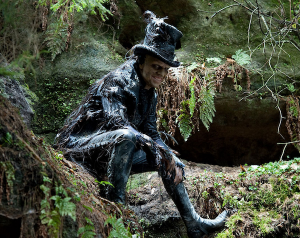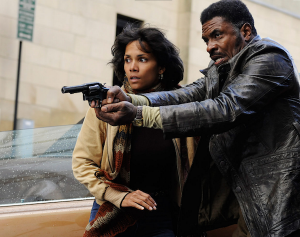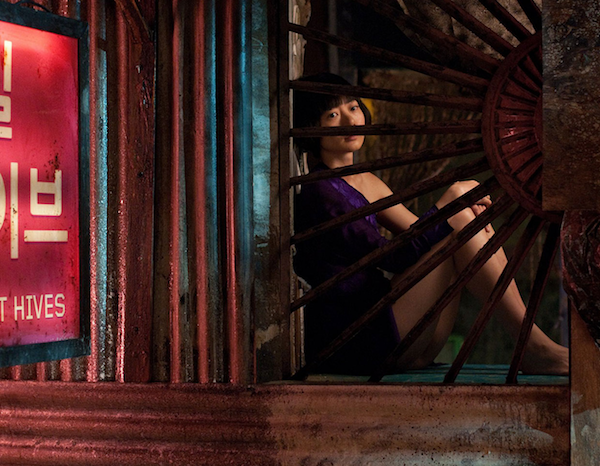“No work of art can ever really testify to the scale of its own impossibility,” Lana said.
It’s been a long time since I’ve read a filmmaker profile as utterly stupendous as The New Yorker’s focusing on Andy and Lana Wachowski, which has the pair open up about their past, their feelings, and their troubles as they’ve endeavored to adapt David Mitchell’s Cloud Atlas over the last few years. There is an unprecedented intimacy and level of detail contained in this look at the blockbuster filmmaking siblings, and it has the feeling of a curtain being peeled back to reveal a very well-balanced pair with the kind of unspectacular genius that comes with being as profoundly well-read, hard-working, and determined as the Wachowskis clearly are. This follows an unexpected personal introduction of the film’s trailer a few weeks ago, which was the first indication the pair might be willing to open up about this project more than any one ever before it. I have a feeling this being and adaptation rather than an entirely original work has relieved them of some of the pressure to avoid speaking for the film.
Despite a history of decided refusal to interact with the press surrounding their films, the two come across not as recovering recluses but as an artistic pair that just didn’t want to be celebrities or wrap up their identities in the commercialization of their art. The profile was constructed by Aleksandar Hemon, a genuine friend of the pair to whom they maintained open access to the troubled, on-again off-again production that eventually became the independently-financed film with the highest budget in history, with a rotating cast of investors that seemed to attach to and abandon the project with the tides of the sea, or perhaps the rolling of the clouds.
Word of the weak presale spread, and scared a few investors enough for them to flee the production. When news of the decampment got out, more investors backed off. “It is super frustrating that people think that it’s like a stock market,” Andy said. “You bet on the movie you like because you have taste. It’s not like buying Shell Oil. You get into the movie business because you like movies. Not because you like money.”
 As frustrating as the experience of gathering the money was, it was not unexpected considering the extreme leap the two, paired with their collaborator Tom Tykwer, were insistent on making. I’ve gone into the odd structure of the film before, and it was not a format they managed to crack until deep into their planning process.
As frustrating as the experience of gathering the money was, it was not unexpected considering the extreme leap the two, paired with their collaborator Tom Tykwer, were insistent on making. I’ve gone into the odd structure of the film before, and it was not a format they managed to crack until deep into their planning process.
It was on the day before they left Costa Rica that they had a breakthrough: they could convey the idea of eternal recurrence, which was so central to the novel, by having the same actors appear in multiple story lines—“playing souls, not characters,” in Tykwer’s words. This would allow the narrative currents of the book to merge and to be separate at the same time.
And even once they cracked their approach, it was a path they’d need to pitch to the book’s author, whose blessing the trio had agreed was absolutely imperative to moving forward.
They explained their plan to unify the narratives by having actors play transmigrating souls. “This could be one of those movies that are better than the book!” Mitchell exclaimed at the end of the pitch. The pact was sealed with pints of Murphy’s stout at a local pub.
But as daring and risky as Cloud Atlas is as a whole, the profile also goes deep into the kind of childhood the siblings shared that lead them to be filmmakers, their varied careers leading up to the decision, and the change in their dynamic after Lana Wachowski revealed to her family that she was not happy as Larry Wachowski, and had accepted herself as a transgender person. The story of her  family’s response is touching and gives us a hint of the kind of family dynamic that could produce a pair as tenacious and professionally unflappable as the Wachowskis, who have dug down into their deepest creative inspiration for their latest, most unprecedented gamble yet.
family’s response is touching and gives us a hint of the kind of family dynamic that could produce a pair as tenacious and professionally unflappable as the Wachowskis, who have dug down into their deepest creative inspiration for their latest, most unprecedented gamble yet.
“ ‘Cloud Atlas’ is our getting back to the spectacle of the sixties and seventies, the touchstone movies,” he said, rubbing his bald dome like a magic lantern. The model for their vision, they explained, was Stanley Kubrick’s “2001: A Space Odyssey,” which the Wachowskis had first seen when Lana, then Larry, was ten and Andy seven.
If you haven’t already, enjoy the Cloud Atlas trailer in all its beauty, and then look forward with me to the responses to the film’s premiere at TIFF. I have my fingers crossed for a WOWED audience and great buzz, but regardless I’ll be chomping at the bit to see this epic for myself on October 26th. I’m hoping Cloud Atlas will put them back in the kind of esteem they deserve, having never made a movie that didn’t push filmmaking forward on one level or another. I personally owe them a great debt as if not for their work, I wouldn’t be typing this for you folks.
In any event, you should absolutely make time to read the full, in-depth profile at The New Yorker.
via /Film
